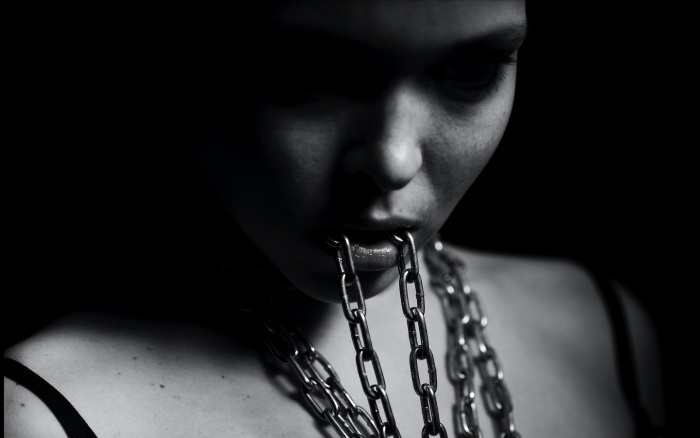When you hear the terms “BDSM,” “Dominatrix,” and “Submissive,” your mind (if you’re honest) usually slams into the gutter with a powerful thud.
The question is, though, have you ever really looked into this lifestyle and what it involves? Or are all your preconceived ideas based on the tales of a certain Christian Grey?
“I flush. My inner goddess is down on bended knee with her hands clasped in supplication, begging me. ‘I like your kinky f*ckery,’ I whisper.” ~ E.L. James, Fifty Shades of Grey
Although the book explored the realms of a dom-sub relationship with all its fantastical movie flair, it didn’t look at the true nature of this unique and not-for-everyone lifestyle.
Being a submissive goes against all that women have been fighting for in so many respects: independence, equality, the right to live as equals, and so on. But there are a certain few who prefer to live a life of servitude. The question is, why? And does being a submissive actually affect the standing of equality? (The answer to the latter question is no.)
Submissiveness has nothing to do with equality. In a relationship in which one person is clearly and consensually in charge, the healthy submissive feels no threat to his or her value or equal standing as a person. Both parties are equal—worthy, individual human beings with needs.
Let’s get down to the business side of things, shall we? Grab a cuppa and read on about what it means for a person to be a sub.
(Maybe after this, you’ll look at your partner and ask the question, is he my dom?)
Knowing you are the submissive can have a strong and seductive mental aspect to it. When you think of serving others, does it put you in a peaceful position? If it feels like the logical thing to do, then it probably is. When people find that they are happy being the submissive, they stop fighting—they’re happy in their role.
You may also have a deep spiritual connection to submission. People often describe their connectedness to their dominant counterparts as similar to being in prayer. They feel a higher power sort of connection when they please them. You may have an overall sense of bliss or complete happiness thinking about or participating in service.
Connecting to the submissive can have an emotional response as well. You may cry uncontrollably or smile so hard and so often that your cheeks hurt. There is a clear sign that you are submissive when you can look upon being of service to someone else and your heart aches with need. Your emotional response is usually the strongest response to the submissive stimulus that you will experience.
Lastly, when you are submissive, you will develop a physical response to dominance exerted at or near you. For many, this is sexual excitement, but it could also be a need to physically get up and do something to bring your closer to that dominance. Some may have moments that only feel “perfect” when they are listening to their primal urge to kneel or kiss someone’s hand or do something to serve them.
Feeling all of these things at one time or another usually means you have a submissive mindset. It may not happen all the time, but the moments that do, you should try to feed it. Develop a service you can provide someone else, volunteer in your community, and certainly (if you can) explore a relationship with dominance and submission at its core. You may find the calling you were hearing was one thing or another (or all of the above). Only you can know if submission is the right direction for you.
But what about dominance?
Is it as simple as relating orders to your submissive, or does that come with its own set of fundamental and emotional rules?
Are you, as a dom, supposed the be the “strong man or woman” ordering your sub to do your bidding?
Or are their layers there?
“‘It’s not as simple as you think it is. So you’ll get your kicks by exerting your will over me.’
‘It’s about gaining your trust and your respect, so you’ll let me exert my will over you. I will gain a great deal of pleasure, joy, even in your submission. The more you submit, the greater my joy. It’s a very simple equation.’
‘Okay, and what do I get out of this?’
He shrugs and looks almost apologetic.
‘Me,’ he says simply.” ~ E.L. James, Fifty Shades of Grey
There’s this awful stereotype that dominants are supposed to be the strong, silent type who never get nervous, scared, or anxious. They never feel any emotion other than “confident and in control.”
Meh. I hate this stereotype.
You’re human. Of course, you have emotions! And they don’t have to be hidden from your submissive. In fact, if you’re trying to build trust, get better at communication, and deepen your relationship, they shouldn’t be hidden. So open up. Admit the things that are on your mind. You never know how your submissive may be able to help or simply be supportive.
By opening up, you also allow the trust to blossom. Your sub doesn’t want an emotional zombie only interested in bedroom gymnastics. They require what they consider to be a partner who will look after them but also exceptionally empathetic to their needs. Also, in doing so, they can be open with their subs emotionally when need be. (It’s that word again: communication.)
So can a dom-sub lifestyle make a better relationship?
It’s not much different than any marriage or relationship. There are still chores to do, bills to pay, family obligations, et cetera. Only, in a dom-sub relationship, the rules are a little different. Since only one partner has final authority, there is little or no arguing. And since the sub puts total trust in the dom, the relationship is more intimate than a 50-50, vanilla marriage with all its inherent power struggles.
Both partners get what they want. The dom gets a comfortable lifestyle and the psychological control they crave, while the sub gets the rules and structure they need and the fulfillment of pleasing the dom.
So, to finish, draw your own conclusions (or let your partner do it for you)!
Ready to join?
Hey, thanks so much for reading! Elephant offers 1 article every month for free.
If you want more, grab a subscription for unlimited reads for $5/year (normally, it's $108/year, and the discount ends soon).
And clearly you appreciate mindfulness with a sense of humor and integrity! Why not join the Elephant community, become an Elephriend?
Your investment will help Elephant Journal invest in our editors and writers who promote your values to create the change you want to see in your world!
Already have an account? Log in.
Ready to join?
Hey, thanks so much for reading! Elephant offers 1 article every month for free.
If you want more, grab a subscription for unlimited reads for $5/year (normally, it's $108/year, and the discount ends soon).
And clearly you appreciate mindfulness with a sense of humor and integrity! Why not join the Elephant community, become an Elephriend?
Your investment will help Elephant Journal invest in our editors and writers who promote your values to create the change you want to see in your world!
Already have an account? Log in.
Ready to join?
Hey, thanks so much for reading! Elephant offers 1 article every month for free.
If you want more, grab a subscription for unlimited reads for $5/year (normally, it's $108/year, and the discount ends soon).
And clearly you appreciate mindfulness with a sense of humor and integrity! Why not join the Elephant community, become an Elephriend?
Your investment will help Elephant Journal invest in our editors and writers who promote your values to create the change you want to see in your world!
Already have an account? Log in.
 Share on bsky
Share on bsky






Read 0 comments and reply